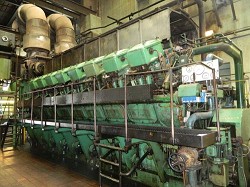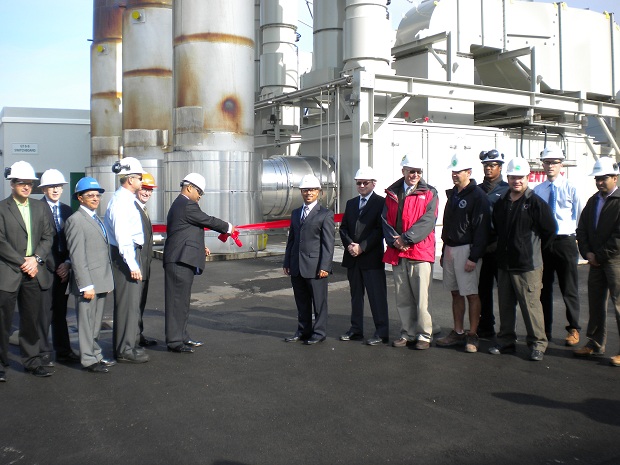 The Old Power Station. All five of the remaining BELCO diesel engines are due to be retired in 2014.If we had the opportunity to start from scratch today, would we choose to build a large, oil-fired power plant back o' town to supply all of our electricity needs? If the answer is 'no' (and believe me, the answer is most certainly 'no') then what the alternative? This is not a hypothetical question. Many of the diesel engines at BELCO are old with some already past their normal working life. This is not a reflection on or indictment of BELCO, this is just a normal business cycle. However, we are lucky because it also coincides with a period when real commercial alternatives are now available and we have the opportunity to take advantage of the experiments and experiences of other countries. We have a chance to leapfrog 50 years into the forefront of global energy and electricity management: our power plant and electricity generation and distribution model would be instanty recognizable to most countries 30 or 40 years go (arguably more than that), so when we replace the aging diesel engines we should be replacing them with a combination of technology and distribution model which is where we want to be in 20 or 30 years time.
The Old Power Station. All five of the remaining BELCO diesel engines are due to be retired in 2014.If we had the opportunity to start from scratch today, would we choose to build a large, oil-fired power plant back o' town to supply all of our electricity needs? If the answer is 'no' (and believe me, the answer is most certainly 'no') then what the alternative? This is not a hypothetical question. Many of the diesel engines at BELCO are old with some already past their normal working life. This is not a reflection on or indictment of BELCO, this is just a normal business cycle. However, we are lucky because it also coincides with a period when real commercial alternatives are now available and we have the opportunity to take advantage of the experiments and experiences of other countries. We have a chance to leapfrog 50 years into the forefront of global energy and electricity management: our power plant and electricity generation and distribution model would be instanty recognizable to most countries 30 or 40 years go (arguably more than that), so when we replace the aging diesel engines we should be replacing them with a combination of technology and distribution model which is where we want to be in 20 or 30 years time.
What are the barriers to this? Our relationship with electricity will need to change. We are used to having it there lurking behind the switches available without a second thought. That is a very expensive option both from an economic point of view and from an environmental point of view. We are not suggesting that we should be contemplating blackouts, but that moving into our energy future will require a change of attitude. For example: our power supply is designed to provide our peak demand plus a bit extra in case of problems. Our peak demand occurs roughly in the middle of the afternoon in August when everyone has their air conditioning on. It also so happens that the majority of households also have their hot water heater on, even though no one is home and no one is going to use the water for several hours. What if, as the outside temperature cranks up one more notch, and the internal air conditioners ramp up one more click, a demand management system could reach into our homes and turn off the hot water heaters for an hour instead of cranking up yet another engine at the power plant? This might sound like a 'big brother' scenario, relinquishing a little control over our lives, but what if this single action could save us several million dollars? It could; and we do mean 'us' as the cost of building new power plants ultimately appears on our bill.
 BELCO celebrated replacing four smaller gas turbines in January 2011, at a total cost of $15 millionSo one of the barriers to our shining energy future is our own attitudes and expectations. What else? Let's talk about the relationship between electricity and our water: we use electricity to heat water in our homes, to chill water for air conditioning and to make our drinking water in desalination plants. There are non-electric alternatives to all of these. For example Bermuda is perfect for solar hot water, yet less than 3% of homes have it installed. this is not new or experimental technology. Bermuda homes have had hot water panels installed (through hurricanes) for more than 40 years. They work, and they are a very effective way to store solar energy for later use. We don't install them because the are quite expensive up front, and we aren't used to them. However this inertia is going to mean that we need a larger power plant. Similarly, how many people, when they think about buying water realize that this water is also the product of electricity? Once again there are alternatives, and using these alternatives will once again reduce the size of the power plant that we need.
BELCO celebrated replacing four smaller gas turbines in January 2011, at a total cost of $15 millionSo one of the barriers to our shining energy future is our own attitudes and expectations. What else? Let's talk about the relationship between electricity and our water: we use electricity to heat water in our homes, to chill water for air conditioning and to make our drinking water in desalination plants. There are non-electric alternatives to all of these. For example Bermuda is perfect for solar hot water, yet less than 3% of homes have it installed. this is not new or experimental technology. Bermuda homes have had hot water panels installed (through hurricanes) for more than 40 years. They work, and they are a very effective way to store solar energy for later use. We don't install them because the are quite expensive up front, and we aren't used to them. However this inertia is going to mean that we need a larger power plant. Similarly, how many people, when they think about buying water realize that this water is also the product of electricity? Once again there are alternatives, and using these alternatives will once again reduce the size of the power plant that we need.
We have not talked about renewable energy here - of course renewable energy, solar panels, wind turbines, wave power, anything where the source of the power is not burned, has a future here. We will see commercial solar farms and large scale alternative energy plants. We will see more efficient electricity generation at our waste to energy plant. But before we can solve the problem of the best way to generate, distribute and pay for electricity, we need recognize the real choices we have in our energy use and to agree on how much we actually need. Greenrock has started this conversation with businesses in our Green Buildings Forum, and with schools in our education programmes. You can join us!
Greenrock believes that with increased energy efficiency in our homes and businesses, with demand management, and by being creative about our choices we can actually reduce our peak electricity demand as an island by perhaps 50%. This means a smaller power requirement even before we start to look at whether that power comes from fossil fuel, burning waste, solar panels, the ocean or any of the amazing alternatives out there. But most importantly this means millions of dollars that don't have to come out of our pockets and millions of tonnes of CO2 that we are not putting in to the atmosphere. Let's start the conversation on our energy future by asking what we need, lower demand is the best alternative to our current plant.

